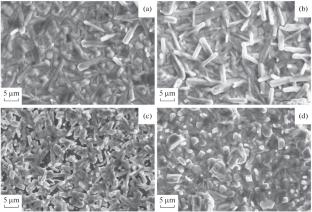锑/硒比对锑/硒薄膜结构和电气性能的影响
IF 1.204
Q3 Energy
引用次数: 0
摘要
摘要 通过化学分子束沉积法,在玻璃基底上以纯锑和硒颗粒为前驱体,在 980 至 1025°C 的温度范围内蒸发 Sb,在 415 至 470°C 的温度范围内蒸发 Se,获得了 SbxSey 薄膜。研究发现,这些薄膜主要由 SbxSey 相组成,Sb/Se 的比例在从原子序数到 0.89 的范围内各不相同。控制成分的比例可以改变晶体的取向,进而改变导电性。本文章由计算机程序翻译,如有差异,请以英文原文为准。

Effect of the Sb/Se Ratio on the Structural and Electrical Properties of SbxSey Films
SbxSey thin films were obtained from precursor of pure antimony and selenium granules evaporated in the temperature ranges from 980 to 1025°C for Sb and 415 to 470°C for Se by chemical molecular beam deposition method on glass substrates. It was found that the films consist mainly of the SbxSey phase and have a different Sb/Se ratio in the range from stoichiometry to 0.89. Controlling the fraction of components allows to change the orientation of crystallites, which, in turn, leads to changes in electrical conductivity.
求助全文
通过发布文献求助,成功后即可免费获取论文全文。
去求助
来源期刊

Applied Solar Energy
Energy-Renewable Energy, Sustainability and the Environment
CiteScore
2.50
自引率
0.00%
发文量
0
期刊介绍:
Applied Solar Energy is an international peer reviewed journal covers various topics of research and development studies on solar energy conversion and use: photovoltaics, thermophotovoltaics, water heaters, passive solar heating systems, drying of agricultural production, water desalination, solar radiation condensers, operation of Big Solar Oven, combined use of solar energy and traditional energy sources, new semiconductors for solar cells and thermophotovoltaic system photocells, engines for autonomous solar stations.
 求助内容:
求助内容: 应助结果提醒方式:
应助结果提醒方式:


